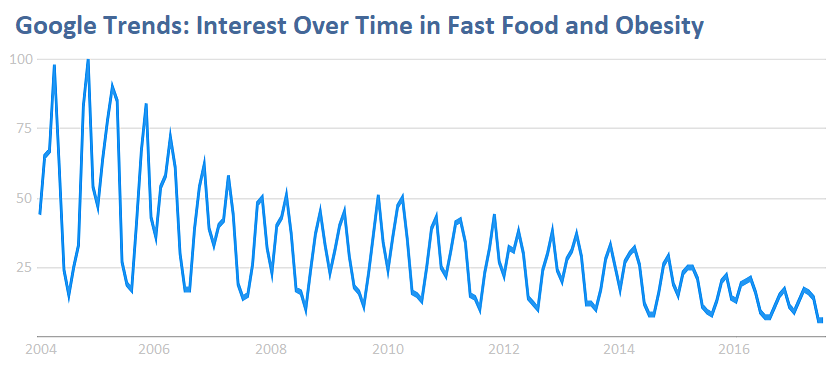
Fast Food: Not So Downscale, Not So Scary
Back in the day, we knew what was causing all this pesky obesity. Fast food. And we knew it was a downscale habit. The solutions were simple. A little education. A little regulation. Next Problem.
Not Exactly Downscale
But it turns out that fast food is not so downscale after all. An analysis to be published in Economics and Human Biology shows that wealth and income does very little to predict how much fast food a person will eat. Jay Zagorskya and Patricia Smith are the authors.
What are the markers of someone who eats more fast food? Working longer hours is one. Checking nutrition labels and drinking less soda are two factors that predict less fast food consumption.
This study lines up with other recent observations about the egalitarian nature of fast food. Gallup pointed out in 2013 that folks in the lowest income brackets are actually the least likely to eat fast food weekly or more. Zagorsky and Smith describe this as a weak, inverted U-shaped curve.
People with very high and very low incomes eat a little less fast food.
Waning Interest in the Fast Food Boogeyman
 So if it’s not a problem of the poor, paternalistic zeal for fixing the fast food problem might fade. And Google search trends suggest less interest in the subject of fast food and obesity.
So if it’s not a problem of the poor, paternalistic zeal for fixing the fast food problem might fade. And Google search trends suggest less interest in the subject of fast food and obesity.
Maybe hard-working, wealthier people don’t need so much protection from bad choices.
While we’re speculating, perhaps fast food business strategies might play a role as well. McDonald’s used to subtly protest its innocence and tell people that exercise was the real issue. When they cut that out and made a few more responsible moves, they started getting less heat.
And then there’s the rise of healthy-ish fast food. Or maybe you prefer to call it fast casual. For just a little more, Chipotle will sell you a burrito you can feel good about. Even if it does have more than a thousand calories. Panera will sell you a “clean” salad with much bravado.
Maybe We Could Focus on Facts?
Zagorsky wants to take us back to the facts in matters of food policy:
If government wants to get involved in regulating nutrition and food choices, it should be based on facts. This study helps reject the myth that poor people eat more fast food than others and may need special protection.
No doubt social values will creep into the process, as they should. But starting with the facts is quite a good idea.
Click here for the study by Zagorsky and Hill. For further perspective, click here.
Fast Food Stop, photograph © George Thomas / flickr
Subscribe by email to follow the accumulating evidence and observations that shape our view of health, obesity, and policy.
July 26, 2017
